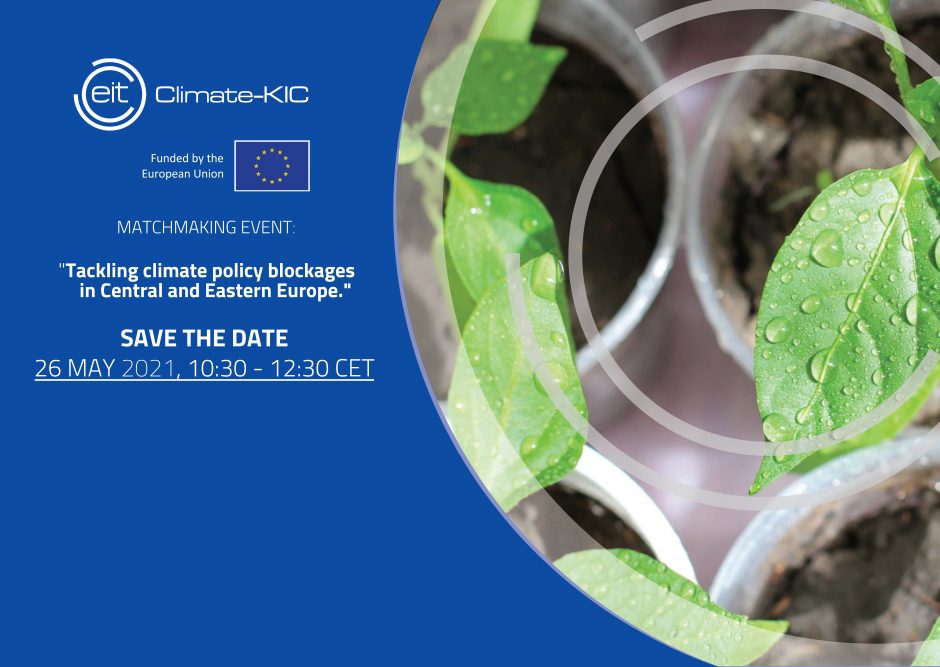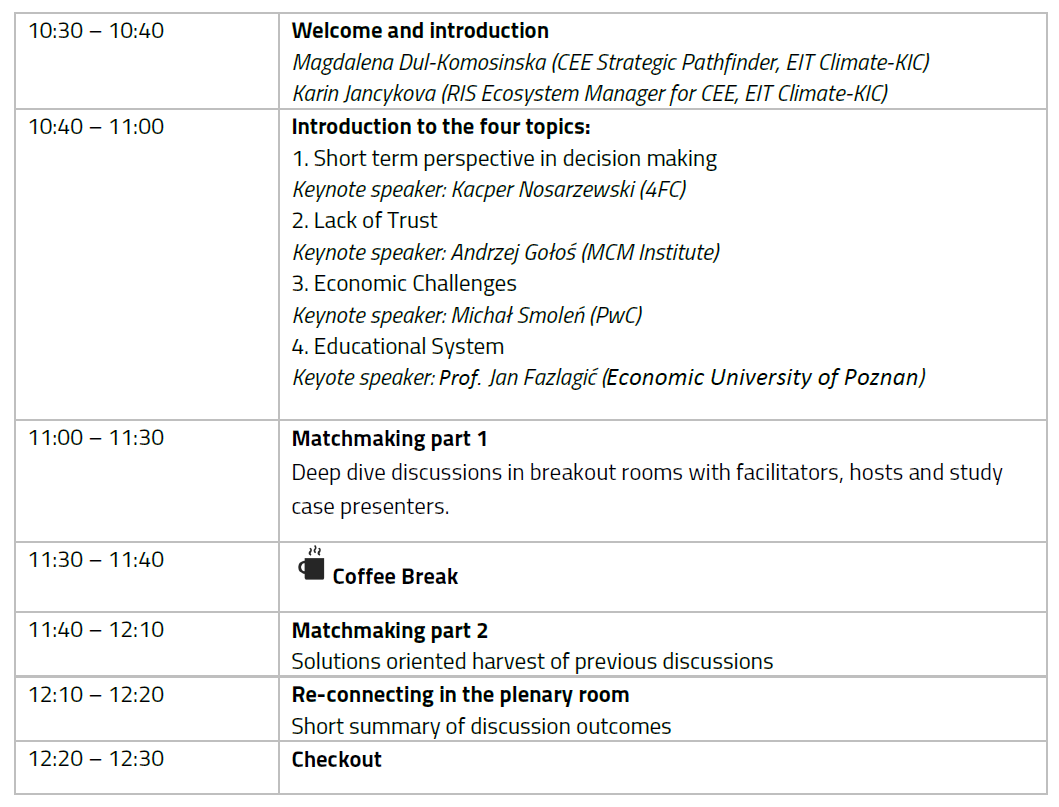Tackling Climate Policy Blockages in Central and Eastern Europe

“Tackling Climate Policy Blockages in Central and Eastern Europe” is a matchmaking event that aims at sharing experiences, learnings, and building new connections on climate policy topics.
Across the CEE region we observe that, despite accelerating risks, climate urgency is seldom prioritized in decision making at the national level. There are several systemic reasons behind it, that we invite you to collectively brainstorm around with invited experts, looking for patterns and potential levers of change.
Agenda:
What challenges will we dive into?
1. Short-term perspective in decision making.
Let’s find out together what is behind short-termism and what are levers that could enable more responsible and forward-literate decisions.
The gap in understanding the connection between decisions made and climate impacts on the society in a shorter and longer perspective:
- Decisions made at all levels guided by short term political or/and economic benefits
- Populistic narratives affecting, and in many cases prevailing in the mainstream communication
- Societies feeling economically underprivileged and focused on catching up with more developed economies
- Lack of synergy among regulatory, political, and civil society initiatives (with different/conflicting drivers and action modes)
- Frequent political alternance hampering long-term ambition, challenging continuity of action, and adding uncertainty for all actors
- Uneven level of capacity in different places of the same country or the broader region
2. Lack of trust
Have you ever tried to build a diverse community based on trust, focused on a common goal, and felt empowered to make it happen? If so, you could most likely share countless observations about what makes it challenging. Cooperation, trust, a shared vision, a sense of responsibility for others, or a focus on the future do not seem to be the greatest strengths of societies in our part of Europe.
Cultural & historic heritage setting the negative framework of disempowerment, distrust, and lack of hope:
- Distrust for authority, institutions, and systems – tendency to cheat the system and go around its rules
- Low social capital, especially in the area of collaboration, focus on individualistic benefits
- Lack of sense of ownership for the external surroundings
- Endemic passive attitude, lack of belief in individual influence / Fatalistic attitude, things will not change here, that is the way we are
- Disempowerment of the masses of people, placing the responsibility at the external agent
- Perception of being underprivileged, second class, or worse
3. Economic challenges
Transforming this part of Europe means overcoming huge gaps that are the legacy of the XX century. Perhaps this could become an unprecedented stimulus to modernisation and innovation in climate change adaptation and mitigation? What could help make this happen? If you feel the underinvestment challenge is the one that matters to you, please join our “economic” room. Let’s unpack the challenges and brainstorm together what the opportunities and levers are in this area.
Areas of economic underinvestment creating vacuums and structural blockages:
- Energy poverty impacting the choices on the type of energy; Houses built with the cheapest technologies
- Obsolete infrastructure at a mass scale (energy inefficient industry, transportation, housing) and number of brownfields and abandoned infrastructures both in urban and rural areas
- Significant underinvestment of basic public systems and functions (healthcare, educations and research, support for entrepreneurship development)
- Deficit of knowledge-based industries and jobs, significant brain-drain, insufficient support for entrepreneurial development, strong underinvestment of R&D sector
- Underinvestment of cities
- Vertical decision-making, not the inclusion of citizens and community in decision making, not effective democracy to enable participation
- Lack of private capital and ambition in leading economic change
4. Education system
For many, it was the COVID -19 pandemic that exposed the weaknesses in current curricula, school infrastructure, or teacher-student relationships. However, many have also previously expressed concern that our educational systems are unable to embed complex climate challenges. Why is this the case? What are the blockages within the way children are educated?
The obsolete paradigm of the educational system / Education system failing to embed complex climate challenges:
- The teacher is the unquestionable source of knowledge and the ultimate authority on what is right or wrong
- Learning focused on memorizing facts and figures
- Siloed knowledge components
- Stimulation towards individual achievements
- No focus on interpersonal skills, collaboration, or discovery
- Low tolerance for failure
- Offering academic knowledge disconnected from practical experience and real life
- Challenge of embedding the complex challenges and high uncertainties of climate action in an educational system that is profoundly based on rationality and doubt, but also deeply divided between conflicting ideologies on pedagogy
- Incapacity of educational systems to support the creation of jobs needed for a concrete transformational change and stop or slow down the diaspora of young people (within and across countries)
Let’s work together to define the levers of change for boosting climate action!

